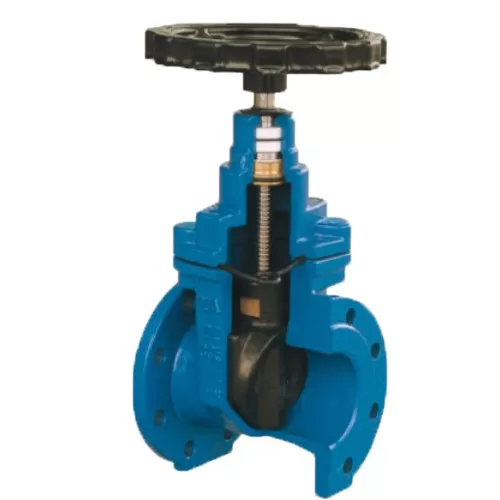A solid wedge gate valve is one of the most commonly used types of gate valves in industrial piping systems. Known for its robust and simple design, the solid wedge offers a rigid, one-piece disc that provides reliable shutoff in a wide range of applications.

Table of Contents
Toggle🔧 What Is a Solid Wedge Gate Valve?
The solid wedge is a single, solid piece of metal that functions as the closure element in a gate valve. When the valve is closed, the wedge moves down and seats tightly against the valve seats to block flow. It provides a tight seal in both directions and performs well in most fluid and gas systems.
Unlike flexible wedge designs, the solid wedge does not allow for deflection, making it better suited for systems with steady temperature and pressure conditions.
🛠️ Key Features
One-piece wedge disc for high structural integrity
Bidirectional shutoff capability
Minimal pressure drop when fully open
Can be installed in any orientation
Simple construction and easy maintenance
🧱 Common Materials
| Component | Common Materials |
|---|---|
| Body & Bonnet | Cast iron, ductile iron, carbon steel, stainless steel |
| Wedge | Cast steel, stainless steel, bronze |
| Stem | Stainless steel or alloy steel |
| Seat Rings | Bronze, stainless steel, or hard-faced alloy |
📌 Typical Applications
Solid wedge gate valves are widely used across many industries due to their versatility and cost-effectiveness. Ideal applications include:
Water supply and distribution
Oil and gas pipelines
Power generation
General industrial fluid handling
HVAC systems
They are especially useful in non-corrosive and low-cycling systems where the temperature and pressure do not fluctuate dramatically.
✅ Advantages of Solid Wedge Gate Valves
Simple and durable: fewer moving parts mean less chance of failure
Cost-effective: lower manufacturing cost compared to flexible or split wedge designs
Strong shutoff performance in clean service conditions
Suitable for high-pressure environments
Wide availability in various sizes and materials
⚠️ Limitations
Not ideal for high-temperature fluctuations – risk of thermal binding
Sensitive to pipe misalignment – no flexibility to accommodate distortion
Can experience seat leakage if debris or buildup interferes with sealing surfaces
Not recommended for throttling – can cause erosion of the disc and seat
🔍 Solid Wedge vs Flexible Wedge Gate Valves
| Feature | Solid Wedge | Flexible Wedge |
|---|---|---|
| Temperature fluctuation | Not suitable | Designed for thermal changes |
| Misalignment tolerance | Low | Moderate |
| Structural rigidity | High | Moderate |
| Maintenance frequency | Low in stable systems | Better for dynamic conditions |
| Initial cost | Lower | Higher |
🔚 Conclusion
The solid wedge gate valve is a time-tested solution for straightforward, on/off fluid control in pipelines. While it lacks the flexibility of more complex wedge designs, its simplicity, durability, and affordability make it a preferred choice for water, oil, gas, and other non-critical applications.
If your system operates under consistent temperature and pressure conditions, the solid wedge gate valve is an efficient and dependable option.
